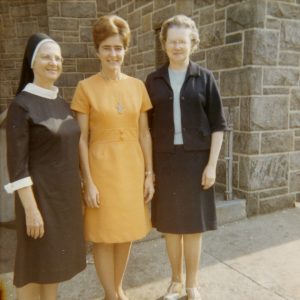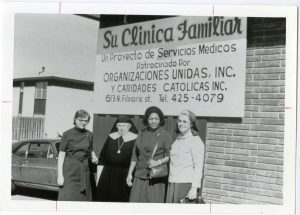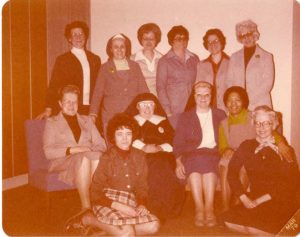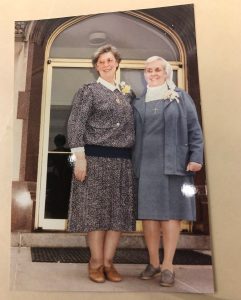This week’s post is guest-authored by Tricia Campbell Bailey, a graduate student of the Library and Information Science program at The Catholic University of America.
The year was 1968, and Robert Roddy had a problem.

Roddy, a hospital administration consultant for the Department of Health’s Migrant Health Program, was tasked with ensuring that the United States’ population of migrant farm workers had adequate access to medical care. Six years earlier, President Kennedy had signed the Migrant Health Act, which provided funds for public and private non-profit health clinics in counties with large populations of migrant farmworkers. However, studies showed that these initiatives were reaching only a small percentage of the migrant population, which had few resources and fewer legal protections. How to make up the shortfall?
Roddy reached out to a Midwestern nurse, hospital administrator, and religious sister named Mary Maurita Sengelaub. After becoming a nurse in 1940 and joining the Sisters of Mercy in 1945, Sr. Maurita taught nursing at Detroit’s Mercy College (now the University of Detroit Mercy) and earned a master’s degree in hospital administration in 1953. She served as an administrator at Mercy Hospital in Bay City, Michigan, and as president of St. Mary’s Hospital in Grand Rapids, Michigan. Roddy hoped that Sr. Maurita could marshall other Catholic organizations to help the Migrant Health Program reach more workers. She wasted no time in doing so: as a member of the Conference of Major Superiors of Women (later the Leadership Council of Women Religious), Sr. Maurita recruited other members to create the National Council of the Migrant Worker Apostolate. At the same time, she was rising through the ranks of Catholic healthcare administration; in 1970, she became the first woman and first non-cleric to head the Catholic Hospital Association (“Celebrating a Life of Faith and Service at the Century Mark,” 2018).

Although the group Sr. Maurita founded would change names several times, it eventually was incorporated in Farmington Hills, Michigan, as the National Migrant Worker Council (NMWC). After the NMWC dissolved in 1994, the organization’s records sat in storage at the Archdiocese of Detroit. When diocesan archivist Heidi Christein discovered them in 2015, she determined that because the organization was more national than local, it was out of the diocese’s collection scope. Christein contacted the Catholic University Special Collections and offered to transfer the collection, which was readily accepted; and the 24-linear-foot collection was shipped to CUA in the summer of 2015 and an online finding aid is now available.
The collection — mainly business correspondence, invoices, meeting minutes, and grant applications — paints a fascinating picture of a group of dedicated people determined to help, yet eventually succumbing to mismanagement and personnel issues. But for more than 20 years, the NMWC did serve the U.S. migrant worker population in tangible ways, and its legacy has continued via some of the projects it spun off from the parent organization.

Healthcare Delivery Through Outreach
The NMWC had two major sub-organizations. The first, the East Coast Migrant Health Project (ECMHP) was launched in 1970 and served migrant workers from Florida to New York by providing professional, bicultural staff to supplement health care delivery through outreach (Dohner 1990). Each year staffers traveled the same northward route the migrants took, providing services in community health centers along the way. The organization also created the East Coast Migrant Head Start Project, the first Head Start program for the children of migrant farmworkers. The Head Start project is the only part of the ECMHP that survives today; it directly provides services in 26 Head Start centers across the Southeast (“Welcome to East Coast Migrant Head Start Project”).
The second branch of the NMWC, the Midwest Migrant Health Information Office (MMHIO), was established in 1983 as the Midwest Migrant Health Center. MMHIO was separately incorporated after the dissolution of the parent organization; today known as MHP Salud, it “develops culturally relevant, cost effective programs which contribute to the success of existing migrant health resources” (“History, MHP Salud”). MHP Salud’s Camp Health Aide project began in 1985 and helps local Migrant and Community Health Centers establish and maintain health promotion programs, including programs for teens, substance abuse prevention and treatment, and a doula program.

End of an Era
In the early 1990s, concerns began to arise about the direction of NMWC and its future. Records from this period mention the lack of a clear mission statement, a “tarnished image,” and “racial dynamics.” In 1994, the NMWC leadership voted to dissolve the organization due to inadequate funding; its two major projects were spun off as described above.
Sr. Maurita stayed active in Catholic health care until her death at age 101 in 2019; her legacy survived even though the NMWC did not. The collection reveals the dedication of the people, both religious and lay, who poured their talents into helping one of the country’s most vulnerable populations. Handwritten notes from migrant camp residents thank the sisters who embedded themselves in these communities. Photographs and slides show daily life in the camps and the bonds formed between residents and caregivers. And the correspondence and meeting minutes illustrate the NMWC leadership’s commitment to maintaining the organization and its work, even when faced with seemingly insurmountable problems. As Sr. Maurita told an interviewer on her 100th birthday: “What’s important is to be able to live our lives enabling others to live healthy, happy lives—especially the poor” (“Celebrating a Life of Faith and Service at the Century Mark,” 2018).
Special Collections at Catholic University houses records related to several other Catholic entities that have worked and continue to work with migrants. These include the United States Conference of Catholic Bishops, Catholic Charities USA, Society of St. Vincent de Paul, and the Mission Helpers of the Sacred Heart. Additionally, the papers of Msgr. George G. Higgins, Msgr. John O’Grady, and Bruce M. Mohler are also relevant.
